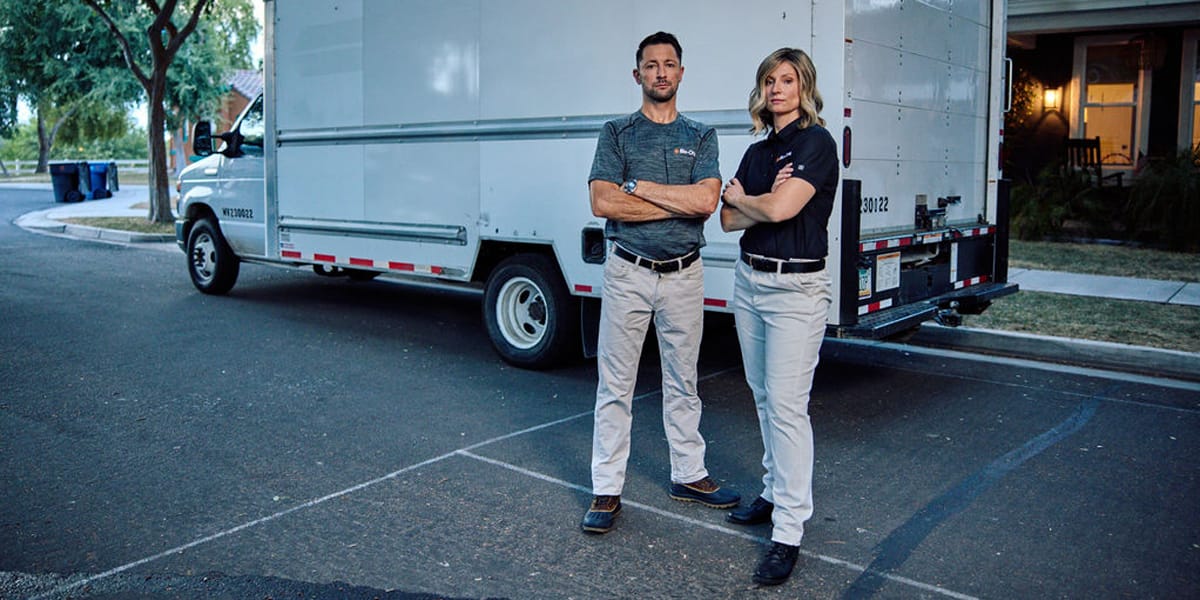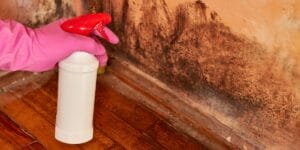
As a property manager, you’re the go-to for just about everything. Leaky faucet? You’ve got someone for that. Broken light fixture? You’re already on it. When a tenant moves out and leaves a mess behind, your maintenance crew knows the drill: clean, repair, and reset.
Situations involving blood, bodily fluids, drug residue, or extreme hoarding go far beyond the scope of general maintenance. They’re biohazard scenes, and treating them like any other mess can create serious consequences for your team, your tenants, and your property.
This isn’t just about cleaning up. It’s about protecting people’s health, following safety regulations, and preventing long-term damage to your investment.
You wouldn’t ask your handyman to handle electrical rewiring without proper training. So why risk their safety—and your liability—by asking them to clean up a potentially infectious scene?

Crime scenes. Unattended deaths. Hoarding situations. Drug residue. Sewage backups.
These aren’t just unpleasant—they’re hazardous, legally complex, and emotionally heavy.
Yet many property managers still default to their maintenance crew or janitorial team when these events happen, assuming it’s “just another mess to clean.”
But this isn’t a clogged sink or scuffed floor. It’s a potential public health risk, and it requires far more than elbow grease and cleaning supplies.
In these moments, well-meaning isn’t enough. Without the proper training and equipment, even a simple wipe-down can become a dangerous—and expensive—mistake.
Proper biohazard remediation demands:
Biohazard scenes may contain HIV, hepatitis B/C, or drug contaminants like fentanyl. One misstep can expose your crew—and your tenants—to serious health risks.
Gloves and masks aren’t enough. Professional teams use PPE (personal protective equipment), containment barriers, and HEPA-filtered vacuums to stop the spread of contaminants during and after cleanup.
Blood-soaked materials, sharps, and hazardous waste must be handled and transported according to strict regulations. Most general cleaning crews aren’t trained in these requirements, putting you at risk of non-compliance and fines.
Biohazard scenes often follow traumatic events. Cleaning up after an unattended death or suicide takes more than a strong stomach—it requires sensitivity, discretion, and the ability to work calmly in highly emotional environments.
Expecting your regular crew to take this on isn’t just unfair—it’s unsafe. The bottom line: if they haven’t been trained for it, they shouldn’t be doing it. Period.
On paper, handling a cleanup in-house is a budget-friendly move. You’ve already got a crew. Why not just hand them some gloves and cleaning supplies and knock it out?
But when the mess involves biohazards, drug residue, or extreme filth, doing your best without professional training is a gamble—and one that rarely pays off.
Here’s what that decision can really cost you:
Surface-level cleaning may not eliminate deep contamination. If a unit still smells, shows stains, or makes tenants uncomfortable, you’ll struggle to lease it, losing days, weeks, even months of income.
Blood, decomposition, urine, and mold leave behind odors that typical cleaning solutions can’t touch. Tenants may report “a weird smell,” but the real issue is invisible contamination that continues to spread.
Biohazards soak into subfloors, drywall, HVAC systems, and insulation. Without professional remediation, you risk locking those problems in, forcing costly repairs down the road.
If a future tenant gets sick or discovers the prior condition, you could face lawsuits, health department fines, or a damaged reputation. Many biohazard scenarios require strict adherence to OSHA and EPA regulations—cutting corners opens you to major consequences.
Your maintenance crew didn’t sign up to deal with hazardous waste. If they’re injured or infected while cleaning, you could be held responsible for their medical costs and lost wages.
What starts as a “small mess” can quickly snowball into a major issue, costing you more time, more money, and more stress than hiring professionals would have from the start.

When your property is facing a situation involving blood, bodily fluids, drug residue, hoarding, or sewage, it’s not just dirty—it’s dangerous and deeply complex. This is where your standard cleaning crew reaches its limit—and where Bio-One steps in.
We’re not a janitorial service. We’re a professional biohazard remediation team trained to handle the scenes no one else should touch.
Here’s what sets Bio-One apart:
Every Bio-One technician is certified in handling bloodborne pathogens, trauma scenes, and chemical decontamination. From fentanyl residue to decomposition fluids, we know how to clean safely, thoroughly, and in compliance with strict OSHA standards.
Biohazard events don’t wait for business hours—and neither do we. Whether it’s 2 a.m. or a holiday weekend, our team is ready to respond fast and begin remediation, minimizing disruption to your tenants and timeline.
We understand how sensitive these situations can be. Our teams arrive in unmarked vehicles and plain uniforms to protect your privacy and your property's reputation. We work quietly and professionally to avoid drawing attention to the situation.
We don’t just wipe down surfaces. Our team investigates what’s behind walls, under floors, and inside vents—because biohazards often seep into areas you can’t see. We eliminate not just the visible mess, but the root causes of odor, bacteria, and health risks.
Biohazard claims are complicated, but we make them easier. Our team handles documentation, photos, and direct communication with your insurance adjuster, saving you time, stress, and paperwork.
When it’s more than just a mess—when it’s a potential threat to health, safety, and liability—you need certified professionals who know what they’re doing and care about doing it right.
Bio-One is here to take that burden off your plate so that you can move forward with confidence.
You’ve built a reputation for running a clean, safe, and professional property. Every decision you make—from the paint color in the hallways to the landscaping out front—affects how your tenants (and future tenants) see you.
That reputation can unravel in an instant if a serious cleanup is handled the wrong way.
The truth is:
Your maintenance team isn’t trained—or equipped—to manage trauma scenes, drug contamination, or biohazard remediation.
And honestly, they shouldn’t be. That’s not their job. It’s not in their job description. And expecting them to take on that kind of risk puts everyone in a dangerous position.
Biohazard cleanup isn’t about wiping up a mess. It’s about:
Bio-One is here, so you don’t have to shoulder this burden alone.
We’re a trusted partner to property managers across the country—ready 24/7 to respond fast, work discreetly, and handle the toughest situations with care and professionalism.
Let your staff do what they do best: keep your property running smoothly.
And let Bio-One take care of the rest—quietly, quickly, and thoroughly.

Disasters don’t wait for you to be ready. A tenant passes away. A unit is discovered in a hoarding state. A sewage backup catches you off guard. When these situations arise, every hour counts—and scrambling to find the right help in the middle of a crisis can lead to costly delays, safety issues, and missteps you can’t afford.
That’s why the smartest move you can make right now is to partner with Bio-One—before an emergency hits.
Here’s how to take the first step:
We serve our communities with care, and we show up when it matters most.
Don’t wait until you’re in the middle of a mess to start looking for help.
Be ready. Be protected. Be proactive—with Bio-One.
Most maintenance staff aren’t trained to safely deal with bloodborne pathogens, drug residue, or hazardous materials. Without the proper PPE, disposal methods, and regulatory knowledge, even a well-intentioned cleanup can lead to health risks, liability, and long-term property damage.
Biohazards include blood, bodily fluids, drug residue (like fentanyl), sewage backups, decomposition, animal waste, and hoarding situations. If there’s a risk of infection, contamination, or toxic exposure, it’s not a job for general cleaning crews.
Improper cleanup can spread contaminants, damage building materials, create lingering odors, or lead to lawsuits and code violations. You may also be putting your team at risk of exposure to harmful pathogens or chemicals.
Yes. Biohazards often seep into subfloors, HVAC systems, and other hidden areas. Bio-One’s certified technicians are trained to inspect and remediate beyond the surface to ensure thorough decontamination.
We offer 24/7 emergency response and can typically be on-site within hours, day or night. When every minute matters, we’re ready to help fast.
No. We understand the importance of discretion. Our teams arrive in unmarked vehicles and wear plain uniforms to protect your tenants’ privacy and your property's reputation.
Often, yes. Many biohazard incidents—such as unattended deaths or trauma scenes—are covered under property or renter’s insurance. Bio-One assists with documentation and communicates directly with adjusters to streamline the claims process.
If the situation involves law enforcement (e.g., a crime scene or death), ensure the scene has been officially released. Then call us. We’ll guide you through the rest—including what to document, what to expect, and how to move forward.
We’re certified in biohazard remediation and trauma cleanup—not just surface cleaning. We follow OSHA and EPA regulations, use professional-grade PPE and equipment, and bring compassion, sensitivity, and discretion to every scene.
Absolutely. We encourage it. We offer free biohazard readiness calls to help you prepare for potential emergencies. You’ll get peace of mind, emergency contact info, and a trusted vendor already in your system.



